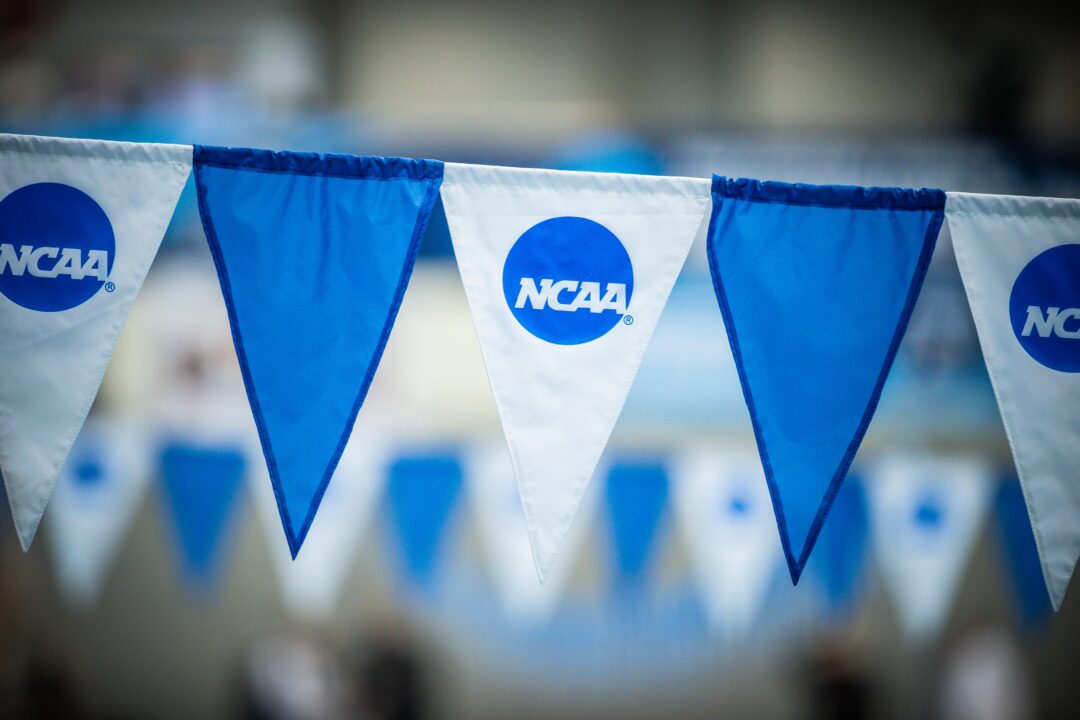The NCAA’s new policy doing away with the “volunteer coach” designation should have a positive impact on swimming and diving programs that have money to spend.
The press release for the policy, which was approved in January and is set to take effect in July, turned out to be a bit misleading. It failed to clarify that volunteer coaches are allowed to be converted into paid positions, but the option remains to keep them unpaid.
There is a slight drawback for combined programs, though. Whereas combined programs could previously employ a maximum of nine coaches — a head swimming coach, head diving coach, four assistants, two volunteer swimming coaches, and a volunteer diving coach — they will now have a limit of eight, though all can now be paid as opposed to just six in the past.
Split programs such as the University of Texas will be able to bring on an extra paid assistant along with the three full-time positions already afforded for a total of four countable coaches per team. Previously, separate programs could employ two volunteer coaches per team — one for swimming, one for diving — while combined programs could have three volunteer coaches — one for men’s swimming, one for women’s swimming, and one for diving
An institution that conducts separate men’s and women’s swimming programs and a combined men’s and women’s diving program may include an assistant diving coach in the limitations for either team, but they’re still limited to eight coaches in total.
Three-time defending NCAA champion University of Virginia, a combined program, was looking into adding a volunteer diving coach until the new policy made that impossible — unless they wanted to cut one of their two volunteer swim coaches already on staff. The Cavaliers won’t be converting their volunteer swim coaches into paid positions next season, but assistant coach Tyler Fenwick still believes the policy change is good for the sport.
“It’s adding more paid positions — that’s a wonderful thing,” Fenwick said. “In a sense, it’s better for everyone. You can bring in two potentially higher-level coaches to your staff. But at the same time, we lose a coaching spot, so there’s a give and take to it. But I think overall for the sport, it’s a good thing.”
Volunteer swimming & diving assistant coaches have traditionally been former swimmers who have a job outside of the sport, or local club coaches who help out with collegiate programs for the added experience. Most NCAA Division I programs currently have volunteer assistants. Even if they remain “volunteers” next season, unpaid assistants will no longer have restrictions on recruiting capabilities.
WHAT WAS THE DIFFERENCE BETWEEN A VOLUNTEER COACH AND A PAID COACH?
- A volunteer coach could not be paid by the athletics department (though they can receive some limited benefits). They could receive compensation from camps run by the athletics department, or be employed by other departments within the institution, which is sometimes the case in swimming & diving when the university owns a club team.
- A volunteer coach could not contact or evaluate prospective student-athletes off campus and could not perform recruiting coordination functions.
Earlier this week, Auburn became the first school to publicly take action on the NCAA’s new rules by posting a job listing for a new assistant swimming and diving coach, in spite of the Tigers’ staff being full last season. Power Five schools with lucrative media rights deals might be able to afford an extra $50,000 to $100,000 annually in their athletic department budgets. However, Fenwick expects most swim and dive programs to keep operating with unpaid assistants. After all, Virginia has built a swimming dynasty in Charlottesville and the program is still looking to make room in the budget for a director of operations.
“In practice, I think it’s pretty much going to stay status quo,” Fenwick said. “You’re going to have some schools with budgets that they can tap into that are much larger based off revenue sports or conference revenue sharing. They may be able to budget to add an additional paid coach, maybe two, but I think the vast majority of teams will stay status quo.”
If it’s more of a semantic tweak than a structural shift, then why did the NCAA choose to make this change in the first place? Back in January, the chair of the Division I council described the move as easing the “burden on campus compliance staffs.”
The NCAA is currently the target of multiple lawsuits alleging that the governing body’s bylaws create an “artificial restraint” that “prevents these unpaid assistant coaches from being paid the fair market value of their worth to the team and university of even wage and hour law minimum wages.” The complaints claim that only does this price-fixing agreement deny volunteer coaches pay for their work, but it also prevents them from accessing health insurance, housing, or other employee benefits that they would typically receive in an open market.
The first lawsuit was filed last November by volunteer baseball coaches from Arkansas and Cal. The second lawsuit was filed a couple months ago and seeks class action status for volunteer coaches from all sports except baseball who worked between March 27, 2019, and June 30, 2023.

Surprising that more teams haven’t advertised for a new assistant like Auburn?
I assume many have already found that position, potentially with a past volunteer coach.